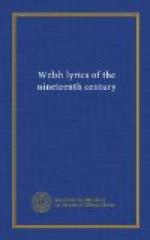Her breast’s like the snowflakes when falling,
So white—and so cold to my pleading.
My heart will soon break
For very love’s sake,
So cold, so bewitching is Dolly.
Three wishes, no more, I would utter—
God bless my sweet Dolly for ever,
May I gaze on her face
Till I finish life’s race,
Then die—in the arms of my Dolly.
Tintern Abbey
Here how many a heart hath broken,
Closed how many a dying eye,
Here how many in God’s acre,
E’en their names forgotten,
lie!
Here how oft for lauds or vespers
Down the glen the bell hath rung,
In these walls how many an ave,
Creed, and pater have been sung.
On the timeworn pavement yonder,
Even now I seem to see,
At the shrine where once he worshipped,
Some old saint on bended knee;
Seems to rise the smoke of incense,
In a column faint and dim,
Still the organ through the rafters
Seems to peal the vesper hymn.
But where once the anthem sounded,
Silence now her dwelling finds,
And the church from porch to chancel
Knows no music but the wind’s;
Perish so all superstition!
Let the world the Truth obey,
Long may Peace and Love increasing,
O’er our fatherland hold sway.
The Nightingale.
When night first spreads her sable wings,
All earthly things to darken,
The woodland choir grows mute and still,
To thy sweet trill to hearken;
Though ’gainst thy breast there lies a thorn,
And thou woeworn art bleeding,
Yet, till the bright day dawns again,
Thou singest, pain unheeding.
And like to thee the helpmeet fair,
Her true-love’s rarest treasure,
When ’neath the clouds the sun has fled,
And hope is dead and pleasure,
When all the friends of daylight flee,
Most faithfully she clingeth,
And through the night of pain and wrong,
Her sweetest song she singeth.
Though ’neath the blight of sorrow’s smart,
Her woman’s heart oft faileth,
She moaneth not but with fond wiles
Her pain in smiles she veileth;
So sings she through the live-long night,
Till hope’s bright light appeareth,
Which glittering like a radiant eye,
Through dawn’s shy lashes
peereth.
IEUAN GLAN GEIRIONYDD.
Evan Evans was born at Trefriw in 1795, his father being, or having been, a shipwright. He, like Alun, was of Nonconformist parentage, and like him, attracted attention by his successes at this or that Eisteddfod. He went to S. Bees, and was ordained in 1826. He died January 21, 1855, without having obtained preferment in his own country, until within a few months of his death. His poetical works were published under the title of “Geirionydd” (Isaac Clarke, Ruthin). As is too often the case with books published in Wales, the title page bears no date.




